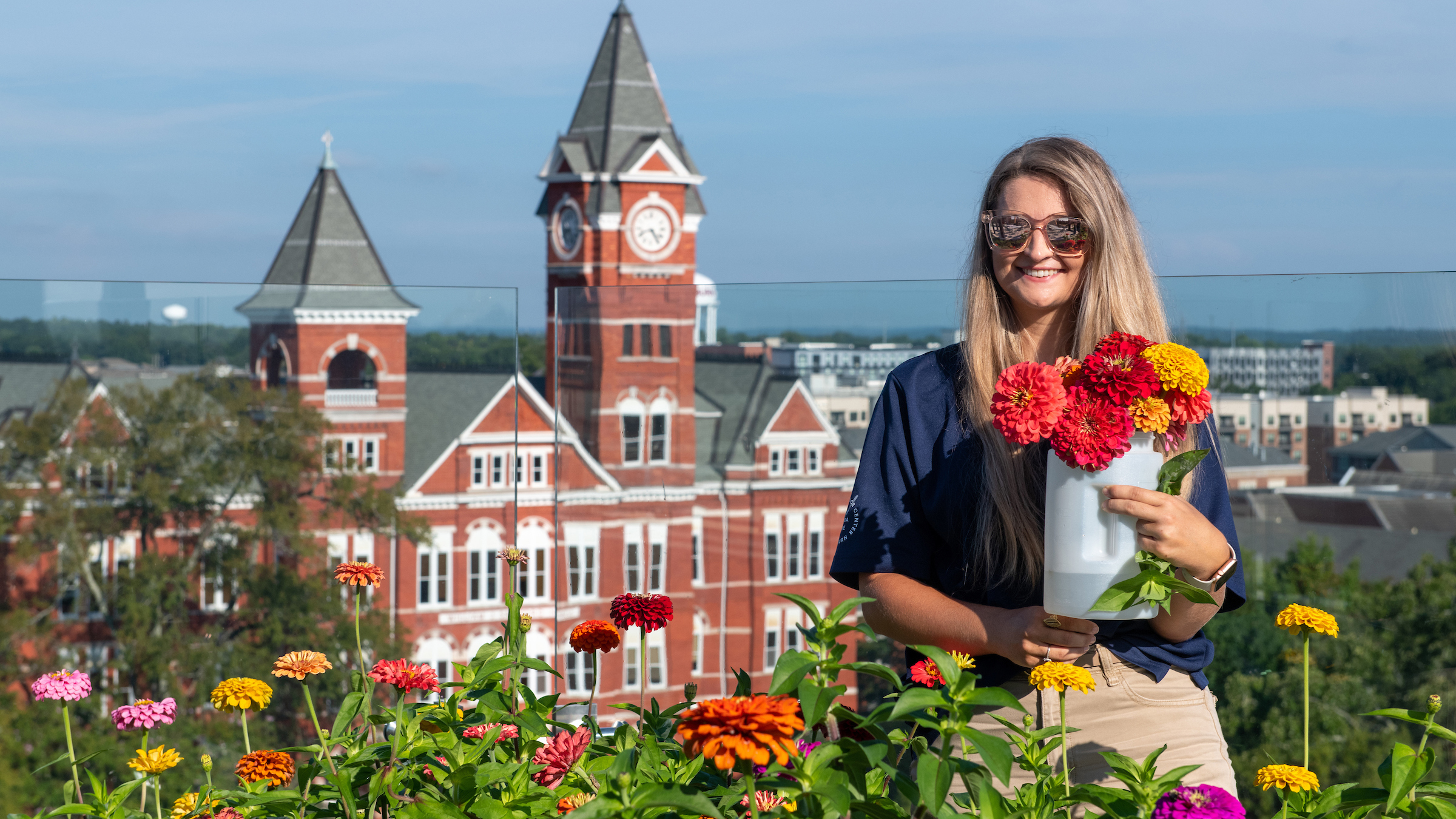You’ve heard of farm-to-fork restaurants.
At Auburn, we offer rooftop to fork, and it’s only an elevator ride away.
Atop the Tony and Libba Rane Culinary Science Center, adjacent to Ag Hill on the Auburn campus, lies an entirely edible rooftop garden operated by Department of Horticulture faculty, staff and students.
“One of the things that we’re interested in in our Department of Horticulture is transformational student experiences,” said Desmond Layne, professor and head of the department. “And they are experiencing something transformational up here.”
Layne first met to discuss the rooftop garden with College of Agriculture Dean Paul Patterson; College of Human Sciences Dean Susan Hubbard; Hans van der Reijden, founder and CEO of Ithaka Hospitality Partners; and Martin O’Neill, director of the Horst Schulze School of Hospitality Management.
“The purpose of the meeting was to discuss the possible involvement in the Department of Horticulture in the management of the rooftop garden,” Layne said. “Together we discussed various ways to engage students from both colleges and the roof-to-table concept envisioned for the space. It was obvious that this was a tremendous opportunity for us to all work together, and we agreed to move forward.”
The roof of the Rane Center, which sits at the corner of College and Thach, has a panoramic view of Samford Hall and, in the not-so-far distance, Jordan-Hare Stadium.
“We have a unique situation here where we are operating a garden that needs to be functional and beautiful,” said Associate Professor of Horticulture Daniel Wells. “And because there’s a partnership between us in horticulture and the culinary science department and the hospitality department, I really felt like we needed someone that would help us bridge that gap.”
The bridge was Department of Agricultural Economics and Rural Sociology alumnus Jack Maruna. The consulting project manager has experience in both horticulture and culinary science.
“This is our Garden of Eden,” Maruna said of the rooftop garden. “Right now, we have 4,400 square feet of rooftop garden space. Obviously, it is a challenge because we are working in extreme conditions up here. One of the biggest challenges up front was learning how to deal with the current conditions on the rooftop and be successful in growing plants.”
One challenge is scheduling harvests, according to Maruna, because the garden is also meant to be beautiful, a destination for visitors and guests.
“When we want to harvest up here, we have to realize that we can’t harvest everything at once like you would do in a traditional garden,” Maruna said. “We have to be very specific with how we harvest so that it doesn’t affect the way the garden looks.”
Another challenge is installing on a roof accessed by a single elevator.
“Beyond that though, just being on top of a roof, it’s all full exposure,” Wells said. “So everything’s full sun. It’s hot. It’s windy all the time. There are no wind breaks. We’ve learned about that. And then water access. So we do have water, but it has to all be pumped up here and we have our own water station. And a couple of times we’ve had no water and that has been challenging. So we’re learning.”
The team had been worried about pollinators. Would bees and butterflies and hummingbirds find the garden seven stories up from the ground?
“They do,” Wells said. “And it’s been exciting to see.”
The garden is divided into several different beds. In one, two master’s students are running vegetable trials, gaining their degrees solely on the rooftop.
“We’re obviously super excited for the students’ opportunity to be involved up here, both undergrad and master’s students,” Maruna said. “One of the things that we’re most excited about is the fact that our students get to interact with the culinary students as well. So culinary students are going to be up here harvesting plants with our students and vice versa. Our students are going to get to go down to the kitchens and learn how these plants that were growing up here are prepared for faculty, staff and the public.”
The restaurant, 1856 Culinary Residence, is a small teaching restaurant with only 46 seats plus a private dining room for 12 and six seats at the bar.
“The concept is really unique and very special,” van der Reijden said. “It’s the first of its kind anywhere in the world where we have an a la carte menu for lunch and a tasting menu for dinner, which is seven to nine courses. We have a chef-in-residence program, and this first year it is Chef Tyler Lyne.”
Lyne said the novelty of the program is the rotating chefs, who provide real-world professional experience in a teaching environment.
“Those don’t really exist,” he said. “If you’re in college, you’re sort of getting education that is a few years behind the current actual. This is a good example of actually working with professionals that have running, operating, successful businesses in the wild.”
Lyne said the rooftop garden has been a gift in the kitchen because locally sourced food is always going to taste best.
“We know we have food on the roof that is going to be plucked and then served at its height of perkiness, at its height of life,” he explained. “It’s going to be the fullest, have the best color, have the best flavor. The minute you pick a fresh sweet ear of corn, you’ve got 10 minutes to eat that corn before those sugars start to break down. So, time is an enemy in this sense.”
Maruna said that from the beginning, the goal was for everything on the roof to be edible. Either the fruit, foliage or flowers of the plants grown on the roof can be consumed. Even the ornamentals can be used both in the hotel as fresh cut flowers and as garnishes for cocktails and dishes.
Wells and Maruna have been thrilled with the response from students who are working the garden.
“Gardening is an everyday thing,” Wells said. “Our students are up here every morning and they worked all the way through the summer. So, it’s been a really exciting experience for them, but hard work.”
“I’ve been thoroughly impressed with our students,” Maruna said. “A lot of the work up here is not glamorous, as you would probably expect. A lot of blood, sweat, and tears have gone into this garden and making it look the way it does, holding it to a standard that the Rane Culinary Science Center is holding it to and our department is holding it to. So, many mornings and lots of 110-degree days in direct sunlight. Just as it is hard on our plants up here, it’s also extremely hard on our students, and all of them have done it with a smile on their face, which is incredible.”
Van der Reijden said he was most excited to see the collaboration happening between the College of Agriculture and the College of Human Sciences.
“When I first met with Dr. Layne, I thought he would want to talk about what we can plant on that rooftop,” van der Reijden said. “But our conversation very quickly went to, ‘Can you imagine a horticulture student on that rooftop working in those gardens? The horticulturalist in training, and a student in the School of Hospitality Management, a culinary science option major, starting to talk together.’ What magic will happen? Because many of our culinary students may have never set foot on a farm, and we have essentially a working farm up there.”
Layne said the rooftop garden links both the preparation of the food and where it comes from in an educational environmental unlike anything else.
“I don’t think that there’s another land grant university in the U.S. that has a culinary science building with a rooftop garden where horticulture students are growing the fruits, the vegetables, the flowers, the herbs, and those are supporting a student-run restaurant down below,” he said. “And we’re excited about the way horticulture students and culinary students and hospitality students will all sort of intermingle and work together in the years to come. It’s a fabulous opportunity.”
Find out how you can be a part of the transformation garden’s journey by contacting our advancement office today!





